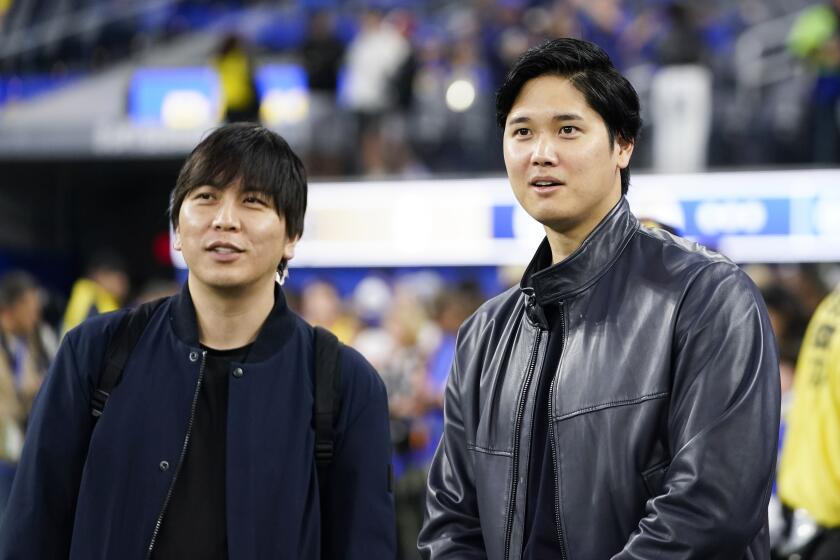Baseball May Come Up Short
An early-September scenario to ponder and Fehr:
The American League West remains a race without a rudder. The White Sox take a substantial hit when Jack McDowell strains ligaments in his right elbow and is forced onto the disabled list. A 2-9 mid-August trip through Chicago, Minnesota and New York waylays the Royals. Eleven games in 12 days against the East-leading Blue Jays and Tigers sucker-punch the Mariners. Nolan Ryan returns, makes a pair of ragged starts and limps off the mound, his hip finally succumbing to three decades of torquing up 100-m.p.h. fastballs.
The Angels, meanwhile, continue to tip-toe through August. Win one, lose one. Win two, lose two. On Aug. 15, they are tied for first and Angel management, yielding at last to public pressure and the urging of Buck Rodgers, trades for Dennis Martinez, Rodgers’ old staff ace in Montreal.
Martinez wins his first two starts and the Angels return to Anaheim on Aug. 30 with a 1 1/2-game lead and a six-game home stand against Baltimore and Toronto.
Martinez wins again and the Angels sweep the Orioles. The lead grows to 3 1/2. Toronto comes to town and Anaheim Stadium is quaking. Crowds of 60,000-plus turn out for the first two games, which the Angels and the Blue Jays split. Sunday’s finale, a sellout, goes 10 innings before Duane Ward hangs a 1-2 curveball that Tim Salmon deposits in the Angel bullpen.
Delirious fans swarm the field. Salmon breaks three tackles rounding third, barely able to touch home plate. Fireworks explode overhead. The Angels’ lead grows to 4 1/2. “YES WE CAN! YES WE CAN!” cries the scoreboard. High above in the owner’s box, Jackie Autry hugs Whitey Herzog.
Then, the season stops.
Far-fetched?
Only if you count the Dennis Martinez and up-by-4 1/2 parts. But the season stopping part is no less implausible than Barry Bonds winning the Triple Crown, because if the requisite set of circumstances fall into place, it could happen:
No ball in September, only a strike.
Donald Fehr’s neatly calculated little bombshell, delivered in front of a built-in national audience before Tuesday’s All-Star Game, certainly struck its target. Not a threat, mind you, Fehr made sure to emphasize. Simply an option the players union had to consider as it maps out strategy for the latest round in the Basic Agreement Wars.
Just like that, Kirby Puckett was upstaged by the prospect of no Kirby Puckett from Labor Day on.
A player strike in September? Richard Ravitch, the designated negotiator for the owners, scoffed at the idea, sloughing Fehr’s suggestion off as a bluff, a bit of clumsy sabre-rattling.
But is it really? Fehr was deadly accurate when he said that “the players’ greatest leverage is not 1994, it’s Labor Day 1993 or thereabout.” Once the season ends and the World Series shares are doled out, the owners will have all of it--and the padlocks for next spring have already been ordered. But with races and pennants still to be decided, with millions of CBS postseason dollars hanging before the owners, carrot-like, the players own all the cards worth holding.
A quick scan of baseball labor history illustrates Fehr’s point. The two lengthiest work stoppages occurred either before the regular season (1990) or during its early stages (1981). With no pressing deadline and no risk of dumping truckloads of potential playoff money, there was no incentive for a quick resolution.
But when the players walked out on Aug. 6, 1985, they were back in uniform by Aug. 8. Too many games had been played, too much was at stake for the two sides to crawl into different corners. At the time, all four divisions had scintillating races bubbling on the stove--with Kansas City eventually nipping the Angels by a single game in the AL West.
However, major league baseball was substantially different then. Major league baseball had a commissioner then, and Peter Ueberroth was instrumental in hammering out a quick accord.
With no such arbiter in 1993--just the way the owners planned it--this season could be crippled by a strike. Ninety-three would be forever remembered as The Four-Asterisk Season: California, Toronto, San Francisco and Philadelphia declared quad-champions by virtue of their first-place standing on Sept. 5, the last day any games were played during 1993.
It is easy to curse Fehr’s name in the darkness, but he is merely playing the owners’ game, seeing them and then raising them.
The owners were the ones who voted last winter to re-open contract negotiations in 1993, granting the players the right to strike before the current bargaining agreement expires on Dec. 31.
The owners are the ones holding a gun to the head of the 1994 season, demanding the institution of a salary cap and the dissolution of arbitration--the union’s biggest victory to date--or else.
Fehr made the move he is paid to make. To him, there isn’t much of a choice--a lockout in ’94 costs us millions, a walkout in ’93 costs them millions. And many owners need that CBS money to pay off bank loans this year.
Call a strike in September and the owners “got a problem on their hands, don’t they?” Fehr reasons. “Maybe they make a settlement.”
Already, Ravitch has organized a special meeting of the owners in mid-August for the purposes of finalizing a proposal to send to the players. On the docket will be yet another postseason format proposal--a no-tier playoff system, to be instituted, quite possibly, this October.
See how the fans react to that one.
More to Read
Go beyond the scoreboard
Get the latest on L.A.'s teams in the daily Sports Report newsletter.
You may occasionally receive promotional content from the Los Angeles Times.






